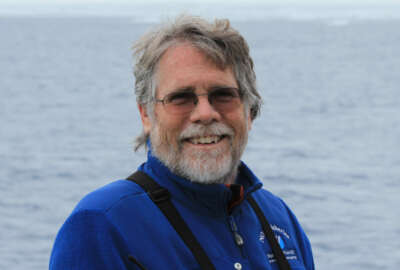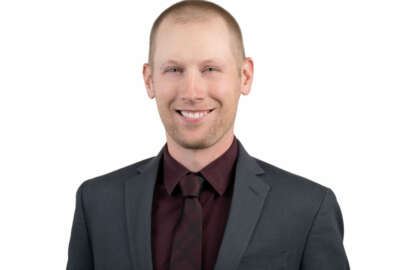Hubbard Radio Washington DC, LLC. All rights reserved. This website is not intended for users located within the European Economic Area.
Federal doctors are Sammies finalists for work on Ebola vaccines and treatments
The COVID-19 pandemic has made it easy to forget that pandemics happen a lot more often than every 100 years. A case in point is the terrifying Ebola outbreak i...
Best listening experience is on Chrome, Firefox or Safari. Subscribe to Federal Drive’s daily audio interviews on Apple Podcasts or PodcastOne.
The COVID-19 pandemic has made it easy to forget that pandemics happen a lot more often than every 100 years. A case in point is the terrifying Ebola outbreak in 2014. A team of researchers at the Biomedical Advanced Research and Development Authority (BARDA), part of the Department of Health and Human Services, in the meantime has enabled development of vaccines, therapeutics and diagnostic tests for Ebola. For their work, doctors David Boucher, John Lee and Daniel Wolfe are finalists in this year’s Service to America Medals Program. David Boucher joined Federal Drive with Tom Temin to talk more about his work.
Interview transcript:
Tom Temin: Dr. Boucher. Good to have you on.
David Boucher: Good to be on. Thank you for having me.
Tom Temin: And first of all, tell us a bit about yourself. Are you a virologist? What kind of a doctor are you?
David Boucher: Well, I actually have a pretty varied background. I did my PhD in cancer biology of all things. I studied genetics associated with prostate cancer. I went on to a physics laboratory where I did nuclear optical imaging, and a little bit of radio chem. And then during the 2014 outbreak of Ebola, I was offered a position out here in D.C. I thought it was an interesting thing to come do. And that’s how I arrived here.
Tom Temin: Wow. And in developing, let’s say, well, a test, I guess you have to have good tests to result in good vaccines, because in some ways, you’re looking at the virus. What’s the essential challenge in understanding a virus such that you can begin to develop tests for it and then therapeutics and vaccines?
David Boucher: Well, you want to identify the unique aspects of it so that your tests are not only confirmatory that something is there, but you want to know exactly what it is down to the level that you possibly can. We’ve done that with RT-PCR. John Lee’s group developed a rapid diagnostic test a little bit quicker than PCR. It detects certain antigens on Ebola that lets you know if it’s there or not.
Tom Temin: And my understanding of Ebola and just reading the news accounts at the time of where it was outbreaking in Africa and so forth, is that in some ways, it’s a more deadly and horrifying virus than COVID-19?
David Boucher: Yeah. Depending on which outbreak you’re looking at, mortality associated with disease can be anywhere from 50% up to 90% at times. Contrast that with COVID, where it’s down in the one, two, 3% range, still a very deadly virus. But Ebola is pretty severe, something you definitely don’t want.
Tom Temin: And in doing this work at BARDA, there must be a lot of collaboration with industry, because don’t they need to be kind of apprised as to how the science is developing? And they must have a lot of research departments of their own at some of the big drug makers and vaccine makers.
David Boucher: They do and that’s really how we do what we do. We partner up with industry, we leverage their expertise, it might not necessarily be for Ebola. In the example of Regeneron, that was not a space that they were in. What we were able to do on the government side is take our experience with things like Anthrax, Smallpox, Botulinum, things that are approved for bio defense indications, pretty unique regulatory pathway. Obviously, you’re not doing human clinical trials on Smallpox fortunately these days. Different regulatory pathway. We have experts that BARDA that really understand that — understand the non clinical work that goes into that, the manufacturing development. We’re able to then take that to industry partners who have technology to discover new therapeutics, vaccines and diagnostics. And it’s been a really great marriage, actually.
Tom Temin: It sounds like you even need to know something about manufacturing and the economics of this whole chain of ecosystem that results in therapeutics and vaccines.
David Boucher: We do, yeah. And so that’s a great thing that BARDA brings to the table is we have subject matter experts from a variety of disciplines. One of the strongest areas that we have is manufacturing. As you do your process development, your scale up, you obviously want a therapeutic that is safe and efficacious. You also want the confidence to know that when you manufacture it, this lot looks like the last lot. We can do that. And yeah, that’s been a great collaboration. On the economic side, we deal with a lot of pathogens for which there is not a commercial market for therapeutics and vaccines. Ebola has been a threat since it was identified in 1976. Development has been great on early discovery — getting through what’s historically called that valley of death, the high price tag of manufacturing, reaching FDA approval. Without a commercial market to pull companies to that, progress was slow, and that’s where BARDA gets involved.
Tom Temin: We’re speaking with Dr. David Boucher. He’s a branch chief for antivirals and antitoxins at the Biomedical Advanced Research and Development Authority — BARDA. He, along with branch chiefs John Lee and Daniel Wolfe, are finalists in this year’s Service to America Metals program. And there must be a, I guess, a human side of this because as you’re working on these different projects, there are people out there getting sick and dying in many cases. And so there must be that sense of there’s no relaxation from this effort until we get to this goal here.
David Boucher: That’s correct. That drives us and I think, you know at BARDA we all understand what we’re working on. They are those therapeutics that we hope we never need. In the case of Ebola, something we often need. Working in D.C., we understand that. I can tell you on a personal note, I’ve been in Africa a few times — one of the most impactful times I’ve visited Ebola treatment unit, where one high-profile case was treated as a baby born to a mother who had unfortunately passed away of Ebola. She received a therapeutic intervention that BARDA worked on. She survived, and it was a pretty fantastic story. And when I visited the ICU, I got to speak with some of the doctors who cared for her. And on the whiteboard, they still had her infusion schedule. So it was a pretty impactful thing and really brought things home for the impact of the work that we do.
Tom Temin: And in the United States, you know, the people are at odds a lot. It seems to be the way we operate. And now there’s a lot of discussion on drug prices and the drug industry and so forth, the interactions with FDA and other parts of the federal government. In BARDA you work closely with the industry — what should people understand about the industry? And its interaction with the government that perhaps we don’t hear about so much?
David Boucher: Yeah, it’s a great question. I think with regard to drug pricing, what we do when we set out to form partnerships is we have an eye on the finish line, and what that pricing is going to look like. Again, for something like Ebola without a commercial indication, we work with the companies, and we want to strike that balance between, you know, a fair and reasonable price and still have their interest. There’s a certain level of profit that’s acceptable in the way our society is built. We try to find that balance. We take on a lot of the economic risks associated with developing. We leverage that to get better prices on the backside, when we do reach success. For countries that might not be able to afford these products — and Ebola is front and center with that one, right — the people at highest risk are in countries that might not otherwise have access to these therapeutics, vaccines and diagnostics. We work aggressively within the U.S. government, with our industry partners, to keep those products available.
Tom Temin: And in working the Ebola beat, if you will, and observing, just because you live in the United States and work for the federal government, the COVID-19 — I don’t know what you’d call it — this panoply or this cavalcade of events that has happened over the last couple of years here, do you think that we are sufficiently learning from one outbreak to the next on how to deal?
David Boucher: We’re getting better. I think a case in point really is that partnership that we formed with Regeneron is an example. We started working with them in 2014, 2015, kind of at the height of the West African outbreak. We pushed the product quickly but safely by stacking up different phases of development, taking some degree of financial risk, but not taking risks on safety and efficacy and doing those things that you have to, you know, you want confidence when you use a drug. We got to approval in six years, we took that same philosophy when we started thinking in January, February of 2020, about how we’re going to develop COVID therapeutics, vaccines and diagnostics. And we went more aggressive. We took more financial risks, we stacked more aggressively. And one of those companies we worked with was Regeneron again, leveraging that same platform we use for the Ebola therapeutic. And we reached emergency use authorization, I believe, in November of 2020. So learning lessons, building on them, improving them, expediting when we need to in a safe way. That’s what we’re getting at. And hopefully, when you ask this question five years from now, from whoever’s sitting here, they have even better answer.
Tom Temin: And I suppose the older guys in society will respect any work you can get going on the prostate.
David Boucher: Yeah, exactly. I still have a lot of talk with my old friends back at UC-Davis, where I went to school, about that.
Tom Temin: All right, Dr. David Boucher is branch chief for antivirals and anti toxins at the Biomedical Advanced Research and Development Authority. He, along with branch chiefs, John Lee and Daniel Wolfe are finalists in this year’s Service to America medals program. Thanks so much for joining me.
David Boucher: Thank you very much. It’s been a great experience.
Copyright © 2024 Federal News Network. All rights reserved. This website is not intended for users located within the European Economic Area.
Tom Temin
Tom Temin is host of the Federal Drive and has been providing insight on federal technology and management issues for more than 30 years.
Follow @tteminWFED





